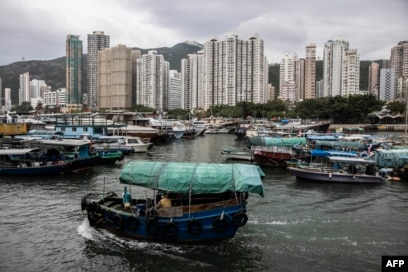Ongoing pandemic restrictions have failed to curb the spread of COVID-19 in Hong Kong, say, experts, as the city struggles to regain its footing in the tourist industry.
The city has long been regarded as an open destination for travellers from abroad, but with strictly enforced restrictions in place for nearly three years, Hong Kong remains closed to many international visitors.
And those who make their living from tourist dollars say the ongoing policies are bad for business.
Ashley Yue, a food tour guide at Hong Kong Food Crawlers, saw her bookings increase in 2018 after her tours were featured in a British TV series.
Since the pandemic, she acknowledges having to juggle other jobs.
For Rory Mackay, his adventure tour company Wild Hong Kong has had to restructure, and he has since moved to New Zealand.
Wild Hong Kong has survived but has not thrived. They have had to be adaptable and continue to shift our point of focus as the COVID pandemic restrictions endured year on year in Hong Kong.
Overseas tourists are still not coming in despite hotel quarantine now finally being dropped. So, although tourism would be great to have again, they are not holding our breath, they told VOA.
Hong Kong called for curfews, vaccination passes and bans on group gatherings from as far back as early 2020.
The city even mirrored Beijing’s “zero-COVID” approach to the disease but abandoned that strategy earlier this year for its population of seven million.
0+3 scheme
In September, Hong Kong dropped quarantine requirements for overseas arrivals, implementing its current “0+3” scheme, in which all international arrivals must monitor their health for three days.
During this time, they are prohibited from entering public venues. After this, arrivals are free to move about Hong Kong, but must wear face masks.
Respiratory disease expert Dr. Leung Chi-Chiu told VOA that the restrictions make little difference to curbing the infection in Hong Kong.
The imported cases only account for less than 10% of daily cases in Hong Kong. The 0+3 arrangement is no different from 0+0 in its ability to curb leakage of immune variants into our community, he said.
“0+0” refers to zero quarantine days
Hong Kong recently recorded 9,219 COVID cases in a single day, its highest number in more than two months.
An increase in coronavirus infections responsible for COVID-19 has been blamed on the highly transmissible omicron subvariants BA.4 and BA.5; however, experts say the number of cases is already going down.
Tours and travel agents
The Hong Kong government announced earlier this month that tour groups would be able to visit major attractions during the three days of self-health monitoring.
Hong Kong travel agents, however, say that the city’s ongoing pandemic restrictions are still discouraging international visitors, a news agency reports.
Last week, a Thai tour group’s four-day tour was overshadowed by the restrictions that saw them eat packed lunches in hotels for the first three days, a news agency reported.
Gary Bowerman, a tourism analyst based in Kuala Lumpur, Malaysia, says that partial reopenings have proven unsuccessful in the region.
Thailand and Japan are good examples – it’s only when travellers feel that confidence in reopening is being demonstrated by the destination itself, that they feel comfortable visiting for tourism.
This is especially highlighted now that most of Asia has fully reopened, so there are many other choices of destinations that are easier to visit, he told VOA.
Hong Kong tourism board statistics
This year, arrivals into Hong Kong have remained low in comparison to before the pandemic, with only 249,699 visitors up until September.
The city enjoyed a strong year for tourism in 2018, with over 65 million arrivals.
But visitor arrivals dropped by 10 million in 2019 during widespread anti-government protests in which demonstrators clashed with police.
Bowerman predicts that next year, Hong Kong will aim to bolster its tourist numbers from neighboring markets.
Hong Kong relies heavily on tourism from mainland China – which accounted for 78% of its visitors in 2018, so it would need China to reopen the border for any significant uplift to occur.
Two of its top 10 visitor markets, Japan and Taiwan, only recently reopened, so the [Hong Kong Tourism Board] will try to leverage those markets in 2023, as well as South Korea and Southeast Asian markets like Singapore, Malaysia and Philippines.
The Hong Kong Tourism Board also announced in October it will give away 500,000 free airline tickets as soon as all restrictions have been lifted.
Some commentators have questioned whether this is the remedy to revive Hong Kong’s struggling tourist industry.
But Bowerman expects the airline offer will become popular.
Tags: COVID-19 restrictions, Hong Kong Tourism Board (HKTB), international visitors, zero-COVID
